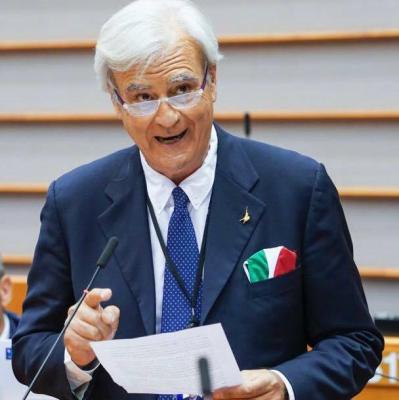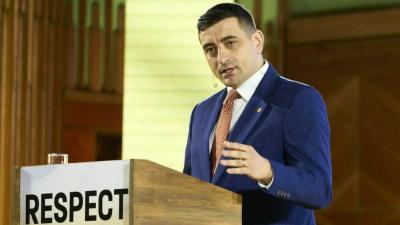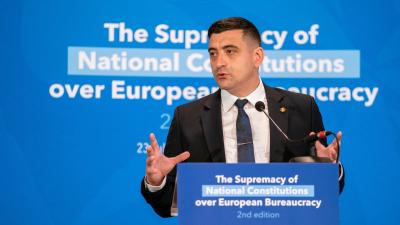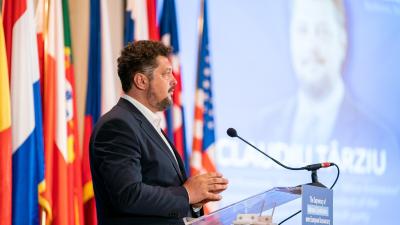Antonio Maria Rinaldi: “A strong Italy is necessary for Europe to be strong too”
Antonio Maria Rinaldi is one of the most recognised and popular Italian politicians. His interventions on radio and television, his forcefulness and clarity in expressing his opinions and his dialectical confrontations with his political opponents are already anthological and have made him an undisputed and appreciated media personality.
Rinaldi was born in Rome in 1955. He is an economist and a university professor. He has held important positions in Italian banking, in the National Commission of Companies and Stock Exchange and has been the general director of the Hydrocarbon Financing Company, the financial parent company of the National Hydrocarbon Entity (ENI). Today, he is a member of the European Parliament for Salvini’s Lega, which is part of the “Identity and Democracy” group and not only an ideological point of reference for the Italian sovereignism, but also a sharp critic of the European Union's economic policies.
The reforms and projects promoted by the Meloni government, with the support of Vice-President and Infrastructure Minister Matteo Salvini and his party, have also renewed the debate on the territorial organisation in Italy. Antonio Maria Rinaldi clears up doubts about issues such as the centralist model of the state, federalist autonomism, the coincidences and differences in the government and also about the future of Italy and Europe.
José Papparelli: In Spain, the construction of the so-called State of Autonomies brought with it problems so serious that they culminated in the separatist pretensions of some Autonomous Communities, threatening the unity of the State. Does the Lega's autonomist idea for Italy resemble the model of the autonomies in Spain?
Antonio Maria Rinaldi: No, this needs to be clarified here. The Lega has for many years provided for administrative autonomy as envisaged in the Italian Constitution itself, which stipulates regions with a special status. For example, we know very well that Sicily has a special regime. This simply means that autonomy is intended to relate the citizen directly to the local government in certain matters. Given that in Italy there is historically a very strong central bureaucratic system, this is also an inconvenience (for the citizens), whereas, on the other hand, having autonomies, as happens in many other States of the European Union, puts the citizen and also businesses in more direct contact with the local administrations. For this reason, the Lega envisages the possibility that the regions could have greater autonomy than they currently have, for example, in the collection of certain taxes and administrative authorisations.
So there is no parallel with other autonomies, such as in Spain, which actually want to create a new independent state. In Italy, it is something completely different, and unfortunately, there is a lot of confusion about this. Today, it is only a question of administrative autonomy that has nothing to do with secessionism or the breaking up of national unity.
However, there have been moments in the history of Lega when one of the party's historical banners and its hallmark, federalism, ended up coming dangerously close to independence...
“Lega per Salvini Premier” is an Italian federalist party and federalism is a political doctrine that promotes regional administration in the same decentralised state. And we see this, I repeat, in many European nations, in Germany or Switzerland itself, where they have a federalism that allows the different Länder to enjoy autonomy. This ultimately benefits both the citizens and the business system, as they can now entertain a more direct and non-centralised relationship contrasting with previous, more centralized systems which often slow down management and, above all, do not understand exactly the needs of the territory. I will tell you more, this strengthens the entire country even more, especially a country like Italy which has an incredible diversity but which is united by common values. By highlighting these different characteristics, it is possible to better manage the territory and in this way, without a doubt, the whole of Italy would have an advantage that it does not have today.
However, the other parties allied in the centre-right coalition and the government have a different idea of territorial organisation.
I think that above all we have to ask the citizens, because the citizens, for our concept of democracy, are the real "shareholders" of the country, to use an economic figure, and therefore, what the citizens decide is sacred for us. And of course, I think that the Italians fully agree with giving more administrative autonomy to the territory in which they live because it means much more empathy, closeness, speed and efficiency in solving local problems. Unfortunately, in Italy today, we are dying of bureaucracy. That's all there is to federalism and autonomy. For us the fact of reducing this pressure, even from the technical point of view of the relationship between citizens and the state, is key and seen as something positive and necessary.
In Italy there is understanding between the centre-right political parties in government. Is there a similar situation in the European Parliament between the ideologically more like-minded groups such as Identity and Democracy and the European Conservatives and Reformists, and even with some members of the European People's Party?
There is a distinction to be made here. The situation in the European Parliament is somewhat different from that in the Member States of the Union. That is to say, in the European Parliament, for organisational and historical reasons, there are different sensitivities within the parliamentary groups. Even in the EPP and the Socialist Party it is sometimes difficult to agree on a single position. We see this during the votes when, for example, on the same issue, there are parties that vote divided because each party has its own philosophy, its own creed. So the European Parliament is not comparable to what happens in Italy where there are three parties in government, namely Fratelli d'Italia, Lega and Forza Italia, which belong to three different families of European groups but have a common goal. The parliamentary groups in the European Union are not like the Italian, let's say national ones, they are very different. We in “Identity and Democracy” certainly have a greater affinity with the “Conservatives and Reformists”, and that is evident in the voting results. But I will tell you more, even within “Identity and Democracy”, where the Lega holds the presidency, we see that often both the French and the German delegations vote differently. This is normal because each country has its own requirements, interests and needs, and we respect and understand them perfectly well.
Given this situation and in spite of it, is it possible to build a different, freer and more sovereign Italy?
That is a good question. We hope so, because there is also an aspect that is generally underestimated: Italy is the second manufacturing power in the European Union after Germany, let's not forget. A strong Italy is necessary for Europe to be strong. If Italy is on its knees, so is Europe. We are going through very particular times and we see that Germany, which is the economic leader of the European Union, for the first time in a long time is in enormous difficulties with a high balance of payments deficit. Indeed, having at least one country like Italy that is strong both economically and politically is an advantage for Europe. As they say, there is strength in numbers, but it is essential and necessary for each country to be strong as well.
First published in: https://disidentia.com/es-necesaria-una-italia-fuerte-para-que-europa-tambien-lo-sea/
Read also
Romania votes, but the label remains: stigma on George Simion and AUR resists the ballot box
The Romanian elections of this week are over, but the debate about their significance is not. George Simion, leader of the Alliance for the Union of Romanians (AUR), came in second to the current mayor of Bucharest, Nicușor Dan, who was presented as an independent candidate, although in practice he was supported by the entire centrist, progressive coalition and a good part of the establishment.
José Papparelli
Javier Benegas
“The political force that will stop the neo-Marxist madness comes from Bucharest”: An interview with George Simion
George Simion is an economist and historian who is well acquainted with the crimes of communism. He is member of the Romanian Chamber of Deputies, president and founder of the AUR party (Alianța pentru Unirea Românilor – Alliance for the Union of Romanians), which today is fighting for the lead in the presidential and European elections in 2024.
José Papparelli
Claudiu Târziu: “EU must return to its roots, to its foundations and to normality”
Claudiu Târziu is a renowned Romanian public figure. He is respected not only for his political activity in the Romanian Senate, but also for his work in culture, journalism and civil society, especially in the defence of life and the family.












Comments (0)